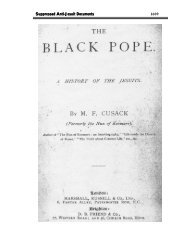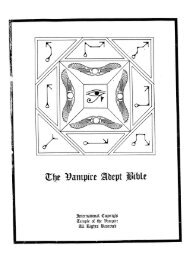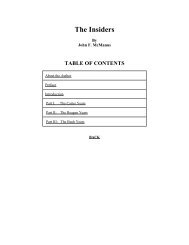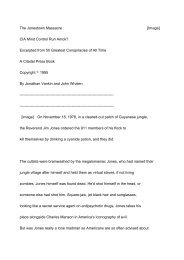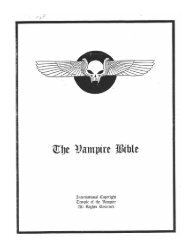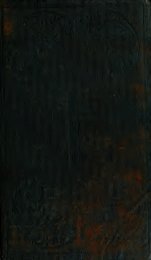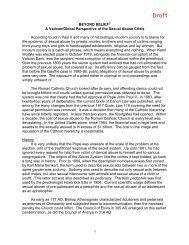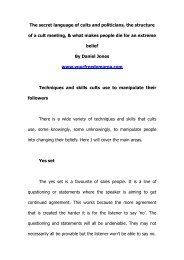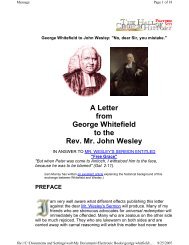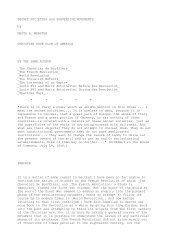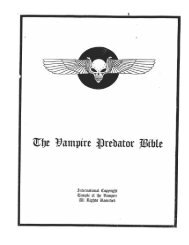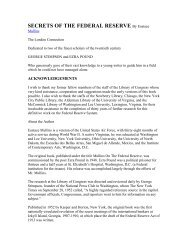- Page 1 and 2:
13^
- Page 3:
kirt^ POPERY CONDEMNED BY SCRIPTURE
- Page 7 and 8:
P R E F A C E. J HE foiiowing Refut
- Page 9 and 10:
PREFACE. Vlf idea of his amazing er
- Page 11 and 12:
P R E F A C E. Vli dings of future
- Page 13:
PREFACE. ix rated Into III nature.
- Page 16 and 17:
12 CONTENTS. Chap. VI. Page A refut
- Page 18 and 19:
il POPERY CONDEMNED BT *' formed sy
- Page 20 and 21:
16 POPERY CONDEMNED EY he may be in
- Page 22 and 23:
18 POPERY CONDEMNED BY always spoke
- Page 24 and 25:
20- POPERY CONDEMNED BY berless quo
- Page 26 and 27:
22 POP£RY CONDEMNED BY ticular rel
- Page 28 and 29:
24) rorEKY CONDEMNhD BY of Antioch.
- Page 30 and 31:
26 rOPERT CONDEMNED BY church has b
- Page 32 and 33:
28 POPERY CONDEMNED EY *' only immo
- Page 34 and 35:
30 raPERY CONDEMNED BY But Peter's
- Page 36 and 37:
S2 POPERY CONDEMNED BY " apostles d
- Page 38 and 39:
34 POPERY CONDEMNEB BY or to rule s
- Page 40 and 41:
36 POPERY CONDEMNED BY " That Peter
- Page 42 and 43:
38 POPERY CONDEMNED EY Fuade us tha
- Page 44 and 45:
•40 POPERY CONDEMNED BY the R. ma
- Page 46 and 47:
42 POPERY COXDEMNliB EY ers ; and I
- Page 48 and 49:
4-4 POPERY CONDEMNED EY apostle Pau
- Page 50 and 51:
46 POPERY CONDEMNED BY CHAP. III. A
- Page 52 and 53:
4 5 POPERY CONDEMNED BY macy which
- Page 54 and 55:
50 POPERY CONDEMNED Et less exalted
- Page 56 and 57:
52 POPERY CCNDEMN^ED BY *' adorned,
- Page 58 and 59:
5'^ 0ERY CONDEMNED EY the tradition
- Page 60 and 61:
56 POPERY CONDEMNED BY " bishop of
- Page 62 and 63:
58 POPERY CONDEMNED BY that it was
- Page 64 and 65:
60 POPERY CONDEMNED BY *' equalled
- Page 66 and 67:
62 POPERY CONDEMNED BY their behalf
- Page 68 and 69:
64! POPIRY CO^'DEIVI^ED BY " meet t
- Page 70 and 71:
66 POPtRY CONDEMNED BY play-actors
- Page 72 and 73:
68 POPERY CONDEMNED BY cial assembl
- Page 74 and 75:
70 POPERY CONDEMNED BY the supremac
- Page 76 and 77:
'J'2 POPERY CONDEMNED BY '• tus^
- Page 78 and 79:
74 POPERY CONDEMNED BY " val days,
- Page 80 and 81:
76 POPERY CONDEMNED BY which he pre
- Page 82 and 83:
VS POPERY CONDEMNED BY SO far from
- Page 84 and 85:
80 POPERY CONDExMNED BY which this
- Page 86 and 87:
82 POPEivY CONDEMN'ED BY a general
- Page 88 and 89:
84 POPERY CONDEMN tD BY • # defen
- Page 90 and 91:
SS POPERY CONDEMNED BY would Wish U
- Page 92 and 93:
S POPERY CONDEMNED BY " whole fraie
- Page 94 and 95:
so rOPLRY COxKEEMNED £¥ unity, di
- Page 96 and 97:
-92 « rOPERY CONDEMNED BY When the
- Page 98 and 99:
9i POPERY CONDEMNED EY ** and prete
- Page 100 and 101:
9S POPERY CONDEMNED BV CHAP. IV. A
- Page 102 and 103:
98 rOPERY COKDEMNED BT Consistories
- Page 104 and 105:
100 POPERY CONDEMNED BY Europe, dis
- Page 106 and 107:
102 POERY CONDEMNED BY covered cons
- Page 108 and 109:
104< POPERY CONDEMNED BY curse him.
- Page 110 and 111:
106 POPERY CONDEMNED BT greatly inf
- Page 112 and 113:
** swer the accusations presented a
- Page 114 and 115:
110 POPERY CO-NDLMNED BY yard shut
- Page 116 and 117:
112 POPERY CONDEMNED BY have been t
- Page 118 and 119:
H* POPERY COKDEMNED BY *' give thei
- Page 120 and 121:
116 POPERY CONDEMNED BY " Apostolic
- Page 122 and 123:
18 POPERY CONDEMNED EY " once in th
- Page 124 and 125:
120 POPERY CONDEMNED BY ing the emp
- Page 126 and 127:
i2'J ' POPERY CONDEMNED BY " bond,
- Page 128 and 129:
.£-1* rOP£RY CONDEMNED EY master,
- Page 130 and 131:
. * 1^6 POPERY CONDEMNED BY pressio
- Page 132 and 133:
128 POPERY CONDEMNED EY her cruelty
- Page 134 and 135:
130 POPERY CONDEMNLD BY phecy. 13.
- Page 136 and 137:
132 POPERY CONDEMNED BY cons, abbot
- Page 138 and 139:
134 POPERY CONDEMNED BY *' pllcable
- Page 140 and 141:
iS6 POPERY CONDEMNED BY Church must
- Page 142 and 143:
J38 POP Era' CONDEMNED BY indispens
- Page 144 and 145:
M-0 POPERY CO.nDEiMNED HY '' either
- Page 146 and 147:
142 POPERY CONDEMNED BY son to char
- Page 148 and 149:
]4i< POPERY CONDEMNED BY which have
- Page 150 and 151:
146 POPERY CONDEMNED BY To shew hin
- Page 152 and 153:
• 148 PO£RY CONDEMNED BY " texts
- Page 154 and 155:
150 POPERY CONDEMNED SY Upon this p
- Page 156 and 157:
152 FOPERY CONDEMNED BY losophers h
- Page 158 and 159:
I54f POPERY CONDEMNED BY ought to k
- Page 160 and 161:
136 POPERY CONDEMNED BT This Is pre
- Page 162 and 163:
158 POPERY CNODEMNED EY y " his nio
- Page 164 and 165:
160 POPERY CONDEMNED BY at the stat
- Page 166 and 167:
\ POPERY CONDEMNED BY purity. He mu
- Page 168 and 169:
164 POPERY CONDEMNED BY extend It t
- Page 170 and 171:
l-^tJ >• roPERY CONDEMNED BY '' y
- Page 172 and 173:
Its POP£RY CONDEMNED BY " *Tis bey
- Page 174 and 175:
170 POPKKY CONDEMNED BY sure him th
- Page 176 and 177:
172 POPERY CONDEMNED BY " them this
- Page 178 and 179:
174 POPERY CuNBEMNKD BY " every spi
- Page 180 and 181:
176 POPERY CONDEMNED BY then, shew
- Page 182 and 183:
178 POPERY CONDEMNED BY tion for ou
- Page 184 and 185:
ISO POPERY CONDEMNED BY the State o
- Page 186 and 187:
182 POPERY CONDEMNLD BY '' would ne
- Page 188 and 189:
184 rOPERY CONDEMNED EY *' many in
- Page 190 and 191:
IS6 POPERY conde,inj:d by strumpet
- Page 192 and 193:
POFERY CONDEMNED EY these doctrine,
- Page 194 and 195:
3 90 POPERY CONDEMNED BY " tures th
- Page 196 and 197:
192 POPERY CONDEMNED BY this object
- Page 198 and 199:
W4! POPERY CONDEMNED BY ** ancientl
- Page 200 and 201:
196 POPERY CONDSMIs^ED BY, giC. phe
- Page 202 and 203:
IDS POPERY CONDEMfED BY \ it with t
- Page 204 and 205:
200 POPERY CONDEMNED BY has invente
- Page 206 and 207:
202 POPERY CONDEMNhD EY ** the wars
- Page 208 and 209:
204^ POPERY CONDEMNED BY pure and p
- Page 210 and 211:
206 POPERY CONDEMNED BY this part o
- Page 212 and 213:
208 POPERY CONDEMNED B^ can teach h
- Page 214 and 215:
' 210 POPERY CONDEMNED BY both of t
- Page 216 and 217:
212 POPERY CONDEMNED BY then, perha
- Page 218 and 219:
~^i' rOPERY CONDLMNED BY These are
- Page 220 and 221:
216 fOPERY CONDEMNED BY " But God h
- Page 222 and 223:
2iS • POPERY CONDLMNED BY " conta
- Page 224 and 225:
^20 PCFERY CO:^DEAINSD EY '* made f
- Page 226 and 227:
222 POPERY CONDEMNED BY R. read the
- Page 228 and 229:
224 rOPERY CONDEMNED BY *' scure di
- Page 230 and 231:
226 POPERY CONDEMNED EY God, they c
- Page 232 and 233:
223 POPERY CONDEMNED BY tity withou
- Page 234 and 235:
230 rOPERY CONDEMNED BY If he have
- Page 236 and 237:
1^2 POPERY CONDEMNED BY evasions to
- Page 238 and 239:
234« POPiKY COXD£::>INED 3Y " pro
- Page 240 and 241:
-o5 rOPERY COKDr.MVr.D -'^' mong ot
- Page 242 and 243:
238 POPERY CONDEMNED BY the bishops
- Page 244 and 245:
aw POPERY CONDEMNED BY ' that is ca
- Page 246 and 247:
^42 POPERY CODEMNED P.Y The R, must
- Page 248 and 249:
t244< rOPERt COND£:\IN£D BY ^ the
- Page 250 and 251:
'246 POPERY CONDEMNED BY trutlXjits
- Page 252 and 253:
248 POPERY CONDEMNED 3Y " tempt the
- Page 254 and 255:
250 POPERY CONDEMNED BY such a conv
- Page 256 and 257:
252 POPERY CONDEMNED BY pels, he pr
- Page 258 and 259:
254 POPi'KY co>:Di:r.iN£D by its v
- Page 260 and 261:
^56 POPERY CONDEMNED BY *' nance of
- Page 262 and 263:
25S POPERY CONDEMNED BY lism by wat
- Page 264 and 265:
260 fOPERY CONDEMNED BY all the Chu
- Page 266 and 267:
^^*^ POPERY CONDEP^NED EY Other rel
- Page 268 and 269:
264" fOPERY CONDEMNED BY State of t
- Page 270 and 271:
266 POPERY CONDEMNED BY even common
- Page 272 and 273:
26S rOPERY CONDEMNED BY difficulty
- Page 274 and 275:
270 POPERY CONDEMNED BY scriptures
- Page 276 and 277:
' 272 POPF.RY CONDEMNED BY tioned b
- Page 278 and 279:
2*74) POPERY CONDEMNED BY opinion o
- Page 280 and 281:
276 POPERY CONDEMNED BY ' ** the sc
- Page 282 and 283:
2TS POPEKY CONDEMNED EY will be req
- Page 284 and 285:
280 POPERY CONDEMNED BY ** of bread
- Page 286 and 287:
282 POPERY COKDEMNED BY reminds the
- Page 288 and 289:
-^ POPERY CONDEMNED BY how are they
- Page 290 and 291:
286 POPERY CONDEMNED BY for the lan
- Page 292 and 293:
28o POPERY CONDEMNED BY " and would
- Page 294 and 295:
290 POFERY CONDEMNED EY about this
- Page 296 and 297:
292 POPERY CONDEMNED BY the Saviour
- Page 298 and 299:
294 POPERY CONDEMNED BY vinity of t
- Page 300 and 301:
296 POPERY CONDEMNED BY' as the R.
- Page 302 and 303:
898 POPERY CONDEMNED BY *' noured t
- Page 304 and 305:
I'iOO POPERY CONDEMNED BY suppositi
- Page 306 and 307:
^0- POPERY CONDEMNED BY When the Ch
- Page 308 and 309: ^04i POPERY CONDEMNED, &C. sion and
- Page 310 and 311: ^06 POPERY COKDEMl^ED EY true. But,
- Page 312 and 313: iiOS POPERY CONDEMNED BY which migh
- Page 314 and 315: 310 POPERY CONDEMNED EY ought to be
- Page 316 and 317: 312 POPERY CONDEMNED BY tation. We
- Page 318 and 319: 314' POPERY COxVDZMN'ED BY purposes
- Page 320 and 321: olO POPERY CONDEMNED BY In the form
- Page 322 and 323: 318 POPERY COKDEMNED BY " go, it sh
- Page 324 and 325: 320 POPERY CONDEMNED BY the difficu
- Page 326 and 327: 322 POPERY CONDEMNED BY Indulgences
- Page 328 and 329: . * S24 POPERY CONDEPINED BY " holi
- Page 330 and 331: 326 POPERY CONDEP.INED BY *' but ch
- Page 332 and 333: 528 POPERY CONDEMNED EY of' their a
- Page 334 and 335: ( 530 ) CHAP. IX. ON THE WORSHIP OF
- Page 336 and 337: 332 POPERY CONDEMNED BY consists, a
- Page 338 and 339: 334 POPERY CONDEMNED BY ** to an An
- Page 340 and 341: 33G FOTERY CONDEMNED BY " whom the
- Page 342 and 343: SS8 POPERY CONDEMN^ED Bt " give tha
- Page 344 and 345: 340 POPERY COiiDEMNED BY '' have me
- Page 346 and 347: 542 rOPERY CONDEMNED BY this new el
- Page 348 and 349: 344 • POPERY CONDEMNED BY *' holy
- Page 350 and 351: 346 POPERY CO^TDEMNED BY variably c
- Page 352 and 353: sis POPERY CONDEMNED BY " neverthdp
- Page 354 and 355: S50 POrERY CONDEMNED BY they know t
- Page 356 and 357: 352 POPERY COKDE.'\IN£D EY receive
- Page 360 and 361: .SJ6 rOPERY CONDEMNED BY the apostl
- Page 362 and 363: 3J8 POPERY CONDEMNED EY thing like
- Page 364: ^SO POPERY CONDEMNED BY to feel the
- Page 367 and 368: SCRIPTURE AND THE FATHERS. SCO prac
- Page 369 and 370: SCRIPTURE AND THE FATHERS. 365 * to
- Page 371 and 372: SCRIPTURE AND THE FATHERS. 367 gain
- Page 373 and 374: SCRIPTURE AND THE FATHERS. 369 reve
- Page 375 and 376: SCRIPTURE AND THE FATHERS. STl the
- Page 377 and 378: SCRIPTURE AN'D THE FATHERS. 373 pie
- Page 379 and 380: SCRIPTURE AND THE FATHERS. 375 I At
- Page 381 and 382: SCRIPTURE AND THE FATHERS. S77 Conv
- Page 383 and 384: SCRIPTURE AND THE FATHERS. 370 ** m
- Page 385 and 386: SCRIPTURE AND THE FATHERS. 2S1 and
- Page 387 and 388: SCRIPTURE AND THE FATHERS. 'SS *' s
- Page 389: SCRIPTURE AND THE FATHERS. S63 reli
- Page 393 and 394: i^Btmmt



